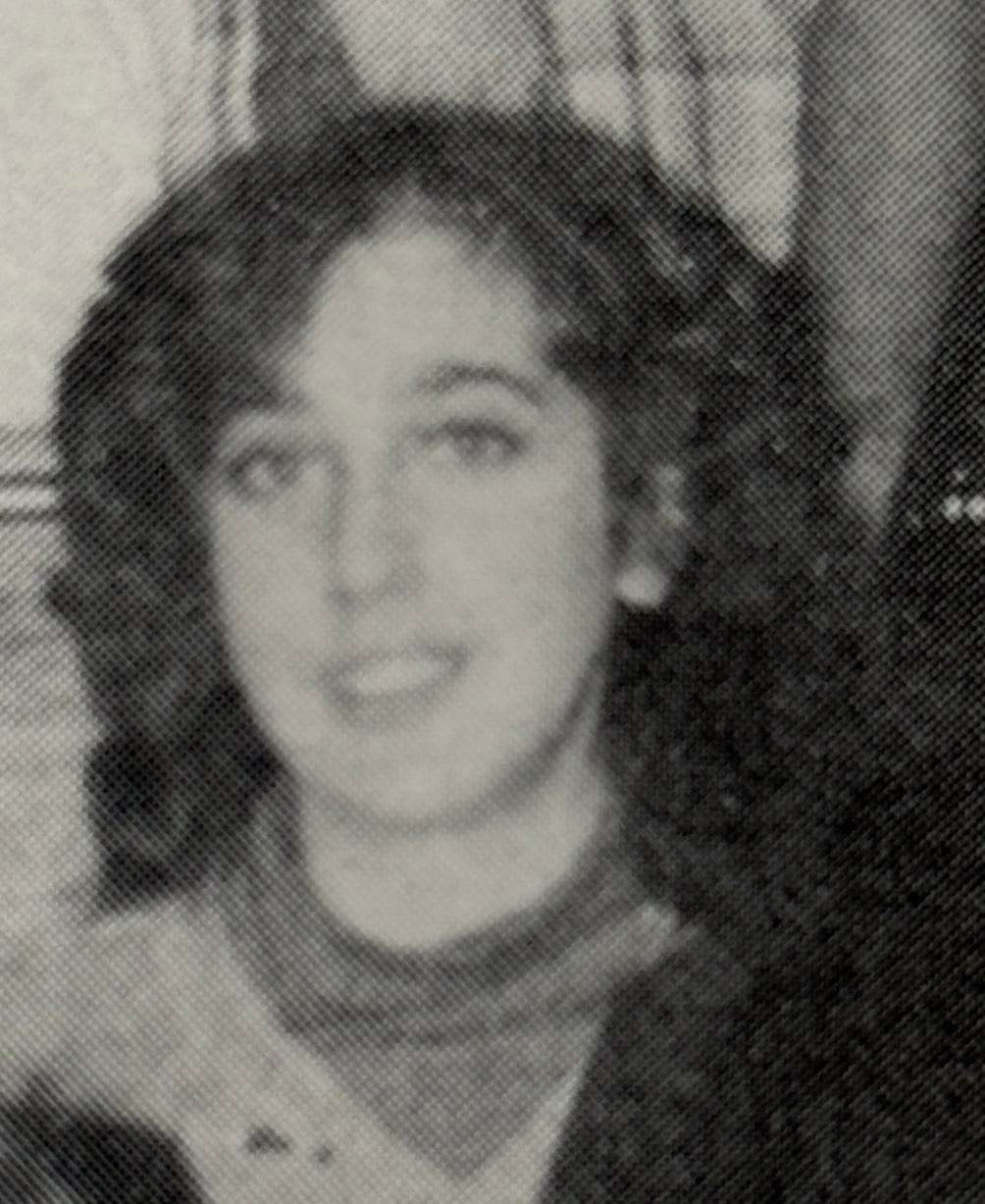When I was in college, I spent one night in bed with Rachel Klingensmith. Just one. As I recall, I had gone back to my dorm room (fortunately, I had a single by then) after a party or a dance or something, and two minutes later there was a knock at the door. I opened it, and there she was. Uninvited, but not unwelcome. Every college boy’s dream. I still have no idea what makes women look at a man and think, “I want that one” but Rachel did that night.
Both of us had had quite a bit to drink. In those days, there weren’t any serious rules about alcohol consumption. She had a mass of curly hair, a slender body, and those big eyes that make one (or at least, me) think of the Knowing Courtesan in novels about Edwardian England. This is the only picture I can find of her, from my college yearbook forty years ago.
She was on the debate team, as was I. The team, by the way, had the ridiculous name of the Amos J. Peaslee Debate Society, and remarkably, had its own endowment, meaning an unlimited alcohol budget. It also won a lot of championships. I don’t remember much else about Rachel. It was a lovely night, and now, at my advanced age, I’m astonished to think that it all took place in a twin bed. I mean, now I don’t even sleep in a bed that small when I’m alone.
Last week I had to drive back and forth to Washington, DC — twice. The route went through Selinsgrove, Pennsylvania, a little river town on the Susquehanna, and in one of those odd little mental switch-flipping moments, I remembered that she was from there. So I Googled her. And I found out something unexpected and disturbing.
She had died. I’ve been thinking about her ever since.
While I am nobody’s idea of a player, I have had my share of relationships with women, ranging from an honest-to-God debutante to Ernest Hemingway’s granddaughter to a French stewardess for Southwest. A couple of these women have had some emotional issues — really — or headed off into some odd destinies. Some have found other men, settled down, and seem happy. Rachel, however, is the only one who has actually passed away. So far, of course.
I’ve lost people I loved. I’m very familiar with the endgame of life, the gradual deterioration and the undeniable, sometimes difficult changes of aging. I don’t really have a problem with it. Some mornings I wake up and my hands ache from, I assume, a little bit of arthritis. I take some Advil and get on with things. Ah, well.
Where that stops, however, is on the rim of oblivion. The vacuum at the center of loss is the fact of absence, of nonexistence. This woman who I held in my arms one night, who I whispered to in the dark, whose body was fascinating and unfamiliar and exciting, whose hair smelled like shampoo, is not just older. She is not. This is completely new territory for me, and I lack a map.
Despite some pretty serious digging, I can’t find out (yet) what happened, exactly. One of the most awful things about people who die young is that they often leave no trace. She was married twice. I don’t think she had any children. I don’t know if she was in some kind of accident, died of a virulent illness, or by her own hand. Or worse. I have no idea. I actually learned she’d died by reading her father’s obituary, which contained that dreadful word “predeceased” and Rachel’s name.
Here’s what I do know: the only person left alive who remembers anything about that awkward, lovely, gentle night is me. The only person who can conclude anything about what it was like, and more importantly, what it meant — including nothing at all — is me. And when I die, which I’m pretty sure I will at some point, it will be as if the entire night never happened at all. Something intense and to me, surpassingly important, just kind of soundlessly disappears.
I’ve been grappling with the implications of that fact ever since I moved back to my little hometown about six months ago. Moving home has taught me a lot, some of which I’ll discuss in another essay. Maybe I’ll write a book. But of all the lessons I’ve learned, one of the most powerful ones came from banging nose-first into the cold, invisible, hard fact that not only is the place different now, but there aren’t a lot of people around who remember how it used to be, or who care.
Robert Frost said once, that he could sum up everything he’d learned about life in three words: It goes on. He was right. This doesn’t apply to Rachel, of course, not anymore, but it applies to the rest of the world. Things keep changing, and the old disappears to make room for the new.
I spent my entire childhood in this place. Children, to paraphrase Gary John Bishop, are magic little sponges. They absorb everything they experience, particularly as transmitted by parents, without the ability to evaluate them, armor themselves, evaluate or distance themselves, or judge what they experience or learn. Experiences, beliefs or opinions go straight into one’s consciousness, firm up like alginate at the dentist, and shape our lives. They feel eternal, unquestioned, solid. I formed my understanding of the world in Corning, New York.
Over the years, I had a lot of those small-town beliefs tested, and sometimes altered. One conclusion was erased, and replaced by a new, modified one. For instance, I lived in a Dominican neighborhood north of Spanish Harlem in Manhattan in my 20s. In that culture, women get dolled up — tight pants, heels, makeup, everything — to do anything. Unlike in Corning, New York, where you’d see women in sneakers, jeans and a work shirt, at a laundromat in Manhattan on 171st Street, you’d see women dressed like they were heading into a casino. Hmmm.
But I never thought about having a belief or an experience replaced by nothing. It never occurred to me to even consider the possibility that someone I would sleep with, the most intimate, human act of all, could simply … not exist. But Rachel doesn’t exist any more. And I don’t know quite what to do with this fact.
It creates this scary sense of emptiness, frankly. It’s like that moment when you’re standing on the edge of a roof, and a tiny voice inside is urging you to jump off. There’s a scene in the first Matrix movie where one of the group, Cipher, betrays everyone else. As a result each person on the team is unplugged, one by one, which kills them — one by one. Switch, another team member, understands what’s about to happen to her. She looks up, with tears in her eyes, and all she can say is, “Not like this. Not like this.” Then she’s gone. That’s how I feel, I guess, about Rachel.
Similarly, a lot of the people and places that had a huge impact on me growing up in my little town don’t exist anymore, either. To quote The Pretenders, when I came back my city was gone. The hospital where I was born and my father practiced, is gone. The building where he had his medical office is gone, too. Almost all of the places I knew growing up are gone. Many of the neighbors and friends I had are gone. What used to be Corning Glass Works, the engine of the entire town, is radically different now. Most of the factories are gone, and two big office buildings are shuttered and empty. My high school is gone.
The hills are the same. The streets are the same. The lovely Victorian houses still stand and look out over the valley. As I write this, a thunderstorm is gathering outside with occasional booms of lightning in the clouds, just as it did for the Iroquois five hundred years ago. The river still flows through the town. Monuments, like the clock tower and the thermometer draw tower, still stand. The factory whistle still sounds. I live in the building that was my junior high school — a century old, altered, but still present. But time has passed, change has happened, and things that were absolutely soaked into me as a magic little sponge are no more. As Rachel is no more.
Did she remember me? Did she ever think of that night? Was it meaningful to her in some way, or just an evening of drunken boinking and an awkward, hungover goodbye? When her life drew to a close, did I have any role in it that mattered? Probably not — Hemingway wrote once that when an animal is dying, all it cares about is itself and its death. Maybe he was right.
And what do I do now? All these questions float around out there, like fireflies in the dark, and nobody knows the answer. A young woman I once knew completely, absolutely, utterly, if only for a night, has now returned to the ground she came from. As will I, one day. Did I make her life any better, even a tiny bit? Do I owe that memory anything? Do I need to honor it somehow? Does it make any difference? Does it need to? How would I know?
I’ve arrived at the point in life of believing that meaning is not something we’re assigned but something we decide upon and create. And so, I choose to create meaning for Rachel by remembering, which is all I can do anyway. I can’t forget. And I don’t want to. Of course, I’m inventing a lot, but I’m going to recollect a certain amount of sweetness to go with the awkwardness. I’m going to think about it, and her, once in a while. I’m going to hope that she knows, or knew, that I’m grateful for that night, that I hope I served her well, so to speak, and that it meant something to me.
One of my favorite novels ever is Mark Helprin’s Winter’s Tale, which was eventually made into a movie starring Colin Farrell and Jennifer Connelly. In the book, the hero, Peter Lake, sees a toddler in a tenement, suffering horribly, and decades later, driven by emotions he doesn’t really understand, tries to find out what happened to her. He ends up in the city morgue, where he has the following exchange with the person who works there, and processes all the dead of New York City in the nineteenth century.
“Maybe, maybe . . . I could help you find someone who passed through this place twenty hours ago—maybe. But not twenty days ago, and not twenty weeks, and never under any circumstances twenty months. Twenty years? That’s almost funny. You might as well go to a wheat field in Kansas and try to trace an individual grain that fell off the stalk two decades before you got there. Whole generations spring up and die without being remembered. Everyone is forgotten. If the parents are alive, which I doubt, I guarantee you that they, too, have forgotten.”
And then:
““What am I supposed to do, then,” Peter Lake asked, “if it’s like you say?”
“Is there someone you love?”
“Yes.”
“A woman?”
“Yes.”
“Then go home to her.”
“And who will remember her?”
“No one. That’s just the point. You must take care of all that now.””
Rachel — I remember you.






We need to go trout fishing
Deep thoughts. Got me thinking.